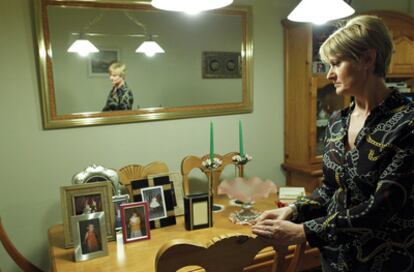Mother of murdered girl refuses to give up fight for justice
Ángeles González's daughter was killed by her estranged father after a judge backed his right to access; the courts now reject they share responsibility
Ángeles González Carreño no longer believes in the justice system. Eight years have passed since her ex-husband murdered their daughter, then killed himself, during one of the visits a judge had set as part of the couple's divorce settlement. González had previously reported her husband for domestic abuse.
This week, after a long legal journey, the Constitutional Court decided to close another door in her face. She was demanding that the judiciary accept part of the responsibility for the death of the seven-year-old. However, the court has decided not to accept her appeal for legal protection as it considers the matter holds no special importance.
González had made 50 reports about her husband, Felipe Rascón, for abuse, threats and even trying to abduct their daughter, Andrea. But she never managed to bring him to trial on those charges. However, at the start of the legal divorce proceedings the judge decided to grant the father supervised visits - visits that, according to González, turned Andrea into a nervous wreck.
"The law put the father's right before that of the child, despite the risk"
For two years, Rascón and Andrea only saw each other at a fixed meeting point, a state of affairs Rascón never stopped appealing against. But the reports made by the social services team that supervised the time father and daughter spent together never gave approval for open visits.
"In fact, the last of the reports ended up saying it couldn't foresee [open visits] happening," says González. Even so, the judge decided to modify the visits and allow Rascón to collect her and see her alone.
A dozen meetings later, he killed Andrea by shooting her three times in Arroyomolinos (Madrid). Afterwards, he committed suicide.
"He had warned me," says González. "That same day, in one of the trials relating to the divorce measures, he turned to me and said: 'I am going to do you the worst harm.' I knew he was referring to Andrea."
On Monday, after the latest setback from the Constitutional Court, 40 women's associations sent a report to the Attorney General's Office, the only body that can appeal the top court's decision. The report said the case was full of errors and that the legal system had not properly protected the girl from "suffering harm."
Neither did it take into account the fact that González was a victim of abuse, they insisted.
Both the High Court and the Supreme Court had rejected the notion that the judiciary bears responsibility in the case. "Deeply regretting the fatal outcome, it is not considered that [...] an abnormal functioning of the administration of justice existed, but rather a collection of jurisdictional decisions that settled, in a way they considered fair, the form in which the communication of a father separated from his daughter should be focused," said the Supreme Court's ruling.
The Themis Association of Women Jurists, which has been handling the case since the Supreme Court decided not to admit González was right a few months ago, is looking at other forms of legal action. "The offense still hasn't expired," says Themis president Ángela Cerrillos.
"The judge was warned, but he still took a negligent decision. The state has to assume its part of the responsibility for the error. The law put the right of the father before that of the child, despite the extreme risk of the situation," Cerrillos adds.
González doubts that the Attorney General's Office will appeal the Constitutional Court's decision. However, she asserts she will not rest until justice is done. She says will use all legal means at her disposal and even take the matter to the European Court of Human Rights in Strasbourg. "What I want is for them to listen to me," she says.
It still hasn't been explained how, despite all the reports against Rascón, the case never reached court. "I am angry because they still haven't read my reports and my appeals," she protests. For her, no other explanation fits.
"I will not stop until somebody assumes responsibility for what my ex-husband did to my family," she says.

Tu suscripción se está usando en otro dispositivo
¿Quieres añadir otro usuario a tu suscripción?
Si continúas leyendo en este dispositivo, no se podrá leer en el otro.
FlechaTu suscripción se está usando en otro dispositivo y solo puedes acceder a EL PAÍS desde un dispositivo a la vez.
Si quieres compartir tu cuenta, cambia tu suscripción a la modalidad Premium, así podrás añadir otro usuario. Cada uno accederá con su propia cuenta de email, lo que os permitirá personalizar vuestra experiencia en EL PAÍS.
¿Tienes una suscripción de empresa? Accede aquí para contratar más cuentas.
En el caso de no saber quién está usando tu cuenta, te recomendamos cambiar tu contraseña aquí.
Si decides continuar compartiendo tu cuenta, este mensaje se mostrará en tu dispositivo y en el de la otra persona que está usando tu cuenta de forma indefinida, afectando a tu experiencia de lectura. Puedes consultar aquí los términos y condiciones de la suscripción digital.








































